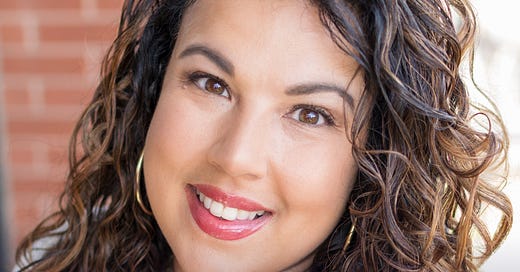Thriving as a Childfree Latina with Monica Rivera
Reflecting on chosen family and the legacy of making people feel seen
There are 3 things I want you to know about Monica Rivera before we wrap up this 3-part interview:
She is a successful marketing expert, business coach, and speaker
Despite tragedy in her early life, she still chooses curiosity
She knows what she wants, and motherhood is not it
Monica is an textbook example of how to thrive in a world that dealt you a shitty hand, and be happy in spite of it. Knowing that she will not have children only adds to her ability to continue designing and enjoying her vida más chévere.
Need to catch up? Watch or listen to the full episode below, or read these previous posts:
Embracing the Chosen Family over Creating Children
Paulette: So in all of this, you talked about a chosen family because you have no more biological family and yet you're childfree. Do you think that the loss of biological family informed that?
Monica: Absolutely. 100 percent. Not everyone will understand this, [but] when something cataclysmic happens, you can usually go one of two ways. I'm sure there's more paths, but it's typically one or two.
And it's either I'm going to create this really large family to replace the family that I lost, or I'm going to make the choice to not have any children. And that is the choice that I made for myself.
The feeling of losing my family, it was so devastating and so strong that I could never imagine doing that to my child. And the thought of if that could even happen is too overwhelming. And because of that, I made the decision to not have children.
Paulette: That was a very deliberate, conscious decision. So before all of that happened, before your grandmother died and the domino effect, did you think you might want children?
Monica: I did! I think I had this very idyllic view of after I turned 21, I graduate from college, my boyfriend—who was yet to be determined—and I are going to get married and then we're going to have our first kid at 24.
I remember having these conversations as a kid with my childhood best friend, where it was all very planned, we had the entire timeline of our future planned. And it's so funny when you think back of what you thought life was going to be and where you are.
And you contrast those two things, sometimes it's a wonderful surprise, and other times you think, “wow, that is so different than what I imagined for myself.”
And in this instance, it is very different than what I imagined for myself. Because I did think that [I wanted children], but I think more so because that's how society works.1 And that's how being Latina and that external thought of, of course, you're going to be a mom and that feeling.
But I will say this: I've never had that pull that some women feel of I'm meant to be a mother. I never had that feeling. And for a while, I actually considered adoption. I thought, “well, adoption would be great because I know what a gift it could be to adopt a child and give them a home.”
Because for years, I remember being in my mid to late 20s thinking, “I just wish somebody would adopt me.” Because I really missed having a mom, I missed being parented. That’s not really talked about. But what that feels like to just have someone make you soup when you feel sick or just any of those things.
And I thought about what that was going to be like. And I couldn't do it. I couldn't bring myself. I thought so deeply about this future child that didn't exist. And I knew that I loved them enough to not want them to experience the pain that I felt.
Paulette: You're just dropping all the gems. The future child that you loved so much that you couldn't put them through the pain. I don't think I've ever heard anyone talk about being childfree in that way. That's really remarkable. So how does the chosen family play into that? You mentioned a niece.
Monica: Yeah, I have a five year old niece who is incredible. My chosen family are friends that I've had for 20 plus years and they had a daughter. And I love her to pieces. There's not a day that's gone by that I haven't FaceTimed her in the morning to say good morning. Even as a newborn, when she can't see three feet past her face, I was just there to say hello and to say good morning.
She is such a joy. But I do have to say as much as I love her, it also reinforces my decision to not have kids. Because there are moments where I see her experience loss in her life, where it might be a friend that she's best friends with moves to another school.
Even that pain of seeing her feel sad is a reminder of why I chose not to do that. There's no way I could protect anybody from anything. But that desire to want to protect someone from the pain is still so strong that I have to remind myself that I can't control all of these things. But I love her to pieces and she is such a gift.
And it has been able to satisfy any part of me that may have had a lingering feeling. It is completely okay because I channel those things into her. I'm still able to share experiences of her. I've passed traditions onto her.
She asked me recently, “Titi, where are your parents?” It was such an interesting way to have a conversation with someone who's five about that. And then she asked, “Oh, what do they look like? I want to see them.”
It was just this really special moment of being able to share them with her in this way that wasn't heavy, but just answering her questions. She got to see them and then that was the end of the conversation because she's five and her mind went off to something else. But it was also really beautiful to be able to have that with her.
Paulette: Oh, I can imagine! She calls you Titi.
Monica: Yeah, she does.
Paulette: So for those of you watching reading who speak Spanish and have never heard the term titi, that is what us Caribbean people say. Mostly Puerto Ricans, sometimes Cubans, but always Puerto Ricans, like listen to a Bad Bunny song, Titi Me Pregunto. So, we are titis.
I love being a titi! My brothers both having children has been really fun from the sidelines. And I did a two whole episode(s) on how childfree people do not hate children. Especially when there are important ones in our lives.
There are people who hate children. Some of those are parents. Clearly, you don't hate kids. You talked about the love you have for a child that is so deep that you couldn't bear one.
Monica: Yeah, I love kids. I really do. I love kids.
Monica’s Childfree Latina Legacy
The top 3 bingos2 childfree people receive include:
who will take care of you when you’re old?
you’d make such a great parent!
but what legacy will you leave?
That last one is often a topic of discussion on this show. You’ve probably seen the video about my own run-in with a man who badgered me about it—at a podcasting conference of all places!
Like all my guests, we know the kind of legacy we’re leaving. And we’re proud of it.
But I think that the real driver for wanting a legacy, no matter how unremarkably one lives their life, is wanting to be remembered. Wanting to know they meant something to someone.
This is how Monica is ensuring that for herself.
Paulette: The thing I talk about a lot with childfree people is legacy because this concept of having one is an important social tradition. And I question a lot of social traditions because I think a lot of them are toxic! You wanted to talk about legacy. So what does that look like for you?
Monica: Legacy is so interesting because, especially as Latinas, it's often thought about your children, right? So, for me, I've had to really grapple with that.
I think we all want to feel as if we've left footsteps behind us, that we actually were here. And I've thought about what is that going to look like for me, will anyone remember that I was here?
I think that the work that we're doing now with our podcasts, that is part of leaving a legacy. With the clients that hopefully I'm helping, as much as they helped me, create businesses and create experiences and have more money for either themselves or for their children or for whoever they are saving it for.
Those are the ways that I believe that I'm leaving legacy. But I knew that when I was working just in corporate, that I wasn't going to be leaving my legacy that way. And it's not to say that someone else can't create a path forward [that way]. But for me, I felt as long as there was someone else's name on the masthead and there was nothing that just was by Monica, it felt as if that wasn't going to be sufficient for me.
So it's really in the lives that I touch. And in the words that I leave in the archives of the podcast episodes, in the things that I've written, in the clients that I've coached, in the material that I've put out into the world, that's what I hope will be the lasting legacy. And I hope that people remember.
The best compliment I can get from someone is when they say, “you've made me feel seen.” And so if I can continue to help other people feel seen, that is a legacy worth leaving.
And that’s a burrito!🌯🌯🌯
Listen or Watch this Interview
This section of the interview came from the second of a two-part episode, and there’s so much still to enjoy. You can hear it all on the podcast episode called You Wanna Do What?! Creating a Childfree Legacy with Monica Rivera (Part 2), which can be found in its entirety everywhere you listen to podcasts, like on Apple:
Or on Spotify:
And now on YouTube:
Like this post? Share with a friend and get on the leaderboard!
Support this publication by:
Maybe it shouldn’t…just sayin’
questions or comments repeated so often we made a game of bingo out of them







